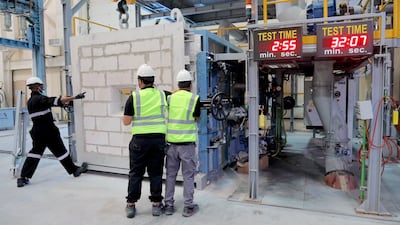Dubai has set out plans to standardise fire safety testing procedures for building materials such as cladding and cables.
The emirate's Civil Defence said on Monday that suppliers and contractors will be required to have products assessed at its dedicated lab before they can be used in construction projects.
Previously, such tests could be conducted at private facilities.
Companies who have had materials independently assessed must have them analysed again by the Emirates Safety Lab to receive a certificate of compliance which confirms they meet the UAE's safety standards.
They must secure the certificate by October in order to register their products as safe for use in building work.
Dubai Civil Defence said items such as doors, cladding, electrical cables, ducts and wireless alarm systems should be tested at the lab before being installed in towers and houses.
Brig Ali Hassan Al Mutawa, Dubai Civil Defence's assistant director general for fire and rescue affairs, said in a statement that the department met more than 150 suppliers and contractors to review the new requirements.
“Dubai Civil Defence aims to enhance the level of safety in addition to providing competitive prices to manufacturers and project owners,” said Brig Al Mutawa.
“Building materials such as fire-resistant doors, cladding, air ducts and wireless alarm systems should be evaluated and tested in the lab to get the certificate of compliance.”
The authority offered an example of safety testing protocols, citing its policy on fire-resistant cables.
Inspectors take three metres of cables from buildings and submit them to the government lab to be tested.
Dubai Civil Defence bears the cost of the test.
If the cables fail, the manufacturing company must pay for any subsequent tests needed to get approval.
UAE safety campaign
Outdated cladding — which causes fires to spread more quickly — and faulty wiring are common causes of building blazes.
The UAE, due to its large number of high-rise residential and commercial buildings, prioritises fire safety.
Sharjah will begin to remove flammable cladding from 40 high-risk buildings this week at a cost of Dh100m in the first stage of a major safety drive.
Authorities have identified 203 residential towers and commercial buildings, both private and government-owned, where flammable cladding is to be replaced.
New fire-resistant cladding reduces the risk of blazes spreading quickly and gives potentially life-saving additional time for emergency services to respond.
The campaign is being launched under the directive of Sheikh Dr Sultan bin Muhammad Al Qasimi, Ruler of Sharjah.
Aluminium composite-panel cladding was prohibited in the Emirates under the country's Fire and Life Safety Code of Practice, which was introduced in January 2017.
Further updates came into effect the following year.
New buildings must be fitted with advanced non-combustible cladding that stops the spread of flames and is more durable under intense heat.
It is not mandatory for buildings built before the new legislation was introduced.































